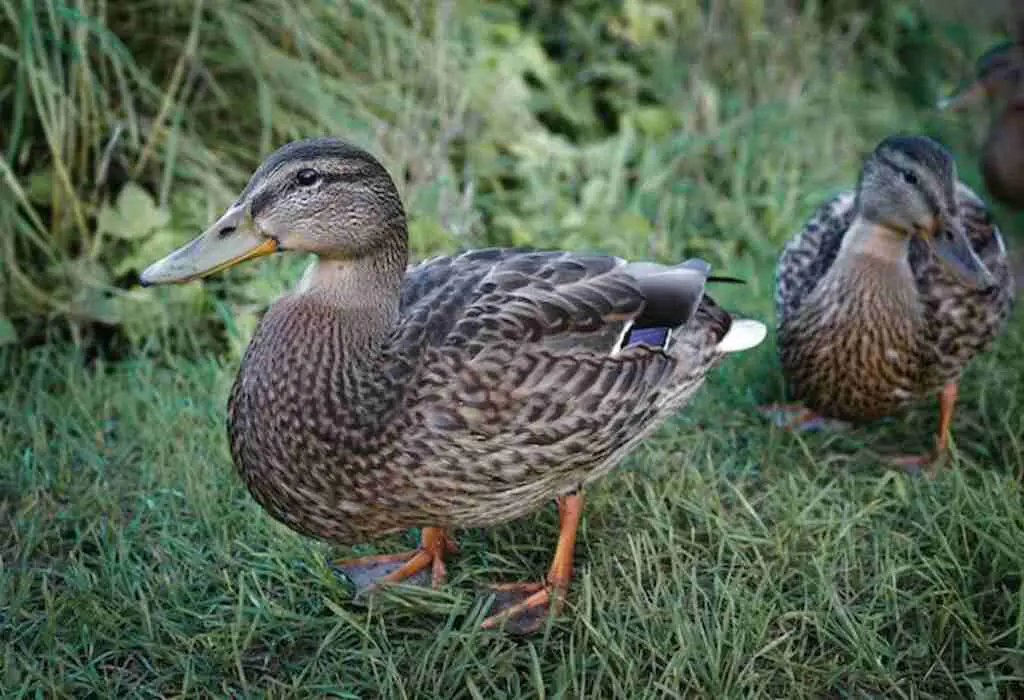Are you one of those people who love feeding the ducks at the park? Have you ever wondered if it’s okay to give them bread?
In this article, we’ll answer the age-old question: Do ducks eat bread? The short answer is yes, but there’s more to the story.
Keep reading to learn about the potential consequences and what to feed ducks instead.
Table of Contents
- 1 The Harmful Effects of Bread on Ducks
- 2 Bread Lacks Nutritional Value for Ducks
- 3 Bread Can Cause Malnutrition in Ducks
- 4 Bread Can Lead to Overcrowding and Competition
- 5 Bread Can Cause Digestive Issues in Ducks
- 6 What Do Ducks Eat in the Wild?
- 7 Alternative Foods for Feeding Ducks
- 8 Vegetables: A Healthy Option for Ducks
- 9 Fruits: A Sweet Treat for Ducks
- 10 Seeds and Grains: A Nutritious Choice for Ducks
- 11 Feeding Ducks Responsibly: Tips and Guidelines
- 12 Frequently Asked Questions
- 13 Conclusion
- 14 Author
The Harmful Effects of Bread on Ducks
You shouldn’t feed bread to these feathered friends as it can cause harm to their delicate digestive systems. Although it may seem like a harmless snack, bread actually lacks the necessary nutrients for ducks to thrive.
In fact, feeding ducks bread can lead to serious health problems, including malnutrition and a condition called ‘angel wing.’ Bread as a harmful food for ducks is a common misconception.
Many people assume that because ducks eagerly flock to bread crumbs, it must be good for them. However, bread lacks the nutrients that ducks need to maintain a healthy diet.
Feeding ducks large amounts of bread can also cause a buildup of undigested food in their stomachs, which can lead to illness and even death.
The harmful effects of feeding ducks bread extend beyond their digestive systems. When ducks rely on bread as a primary food source, they become less likely to search for other, more nutritious foods.
This can lead to malnutrition and weakened immune systems, making them more susceptible to diseases.
Therefore, it’s best to avoid feeding ducks bread altogether and instead offer them foods that are rich in nutrients and natural to their diets.
| Harmful Effects |
|---|
| Malnutrition |
| Overcrowding |
| Digestive Issues |
| Diseases |
| Water Pollution |

Bread Lacks Nutritional Value for Ducks
Feeding bread to ducks is not only unhealthy, but it also lacks any significant nutritional value. Ducks require a balanced diet to maintain their health and wellbeing, and bread alone cannot provide the necessary nutrients.
In fact, bread can be harmful to ducks as it can lead to malnutrition, obesity, and even death. Ducks have specific nutritional requirements that must be met for them to thrive. These requirements include protein, fat, vitamins, and minerals.
Bread, however, is low in essential nutrients and high in carbohydrates. Feeding ducks bread on a regular basis can lead to malnutrition, as they are not receiving the nutrients they need to maintain good health.
Fortunately, there are many alternative foods that are nutritious and safe for ducks to consume. These include grains, seeds, vegetables, and fruits.
Providing ducks with a varied diet that meets their nutritional needs will help to ensure their health and happiness.
By avoiding bread as a harmful food for ducks and offering them a balanced diet, we can help to promote the wellbeing of these beloved birds.
As mentioned before, bread can cause malnutrition in ducks, which can lead to serious health problems.
Ducks that are malnourished may experience stunted growth, weakened immune systems, and other health issues.
It’s important to remember that feeding ducks bread is not a harmless activity and can have serious consequences.
In the next section, we’ll discuss how bread can lead to obesity in ducks, further emphasizing the importance of avoiding this harmful food.
| Nutrients | Amount per 100 g |
|---|---|
| Protein | 9.1 g |
| Fat | 2.3 g |
| Carbohydrate | 49.2 g |
| Fiber | 2.7 g |
| Sugar | 4.7 g |
| Calcium | 32 mg |
| Iron | 2.7 mg |
| Magnesium | 29 mg |
| Potassium | 144 mg |
Bread Can Cause Malnutrition in Ducks
If you want to keep your feathered friends healthy and strong, it’s important to know that bread can lead to malnutrition in them. Although ducks may enjoy eating bread, it is not a suitable food source for them.
This is because bread lacks the essential nutrients that ducks need to thrive, such as protein, vitamins, and minerals. To understand why bread can be harmful to ducks, it’s important to know more about the nutritional requirements of ducks.
Ducks are omnivores, which means they need a balanced diet of both plant and animal matter. Their diet should include a variety of foods such as insects, seeds, and aquatic plants. A diet that is high in carbohydrates, like bread, can lead to weight gain and malnutrition.
Here are a few reasons why bread can cause malnutrition in ducks:
- Bread is low in protein, which is essential for muscle growth and repair.
- Bread, being high in carbohydrates, can contribute to weight gain and obesity.
- Bread is low in vitamins and minerals, which are essential for overall health.
- Overconsumption of bread can lead to a condition called ‘angel wing,’ where the wings of a duck become deformed and cannot support flight.
In conclusion, bread as a harmful food for ducks is a common misconception. While ducks may enjoy eating bread, it is not a suitable food source for them.
Bread lacks the essential nutrients that ducks need to thrive and can lead to malnutrition and other health problems.
If you want to feed your feathered friends, it’s best to stick to a balanced diet of foods that meet their nutritional requirements.
In the next section, we’ll discuss how bread can lead to overcrowding and competition among ducks.
| Nutrient Deficiency | Consequence |
|---|---|
| Protein | Growth retardation, poor feather quality |
| Calcium | Weak bones, poor egg quality |
| Vitamin A | Poor vision, weak immune system |
| Vitamin D | Soft bones, poor egg quality |
| Vitamin E | Reproductive issues, poor immune system |
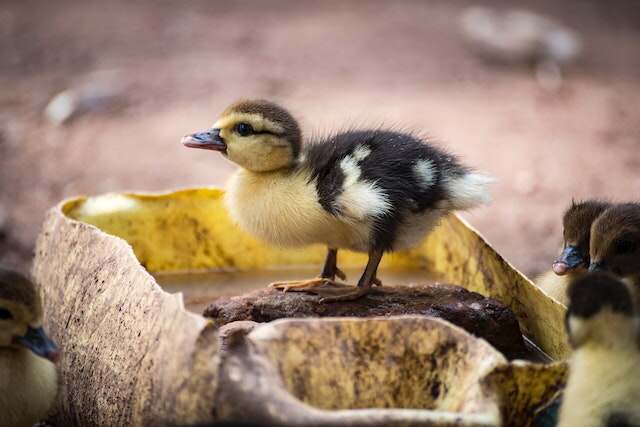
Bread Can Lead to Overcrowding and Competition
Eating bread can result in overcrowding and competition among ducks due to the flock’s reliance on a limited food source.
When people feed ducks bread, they often attract large numbers of birds to a single location. As more ducks gather, they have to compete for the available food.
This can lead to aggressive behavior and fighting among the birds. In some cases, ducks may even trample each other in their rush to get to the bread.
The problem is not just that bread is a harmful food for ducks. It’s also that feeding ducks bread can have unintended consequences that harm the birds in other ways.
Overcrowding can lead to the spread of disease, as ducks that are in close proximity to each other are more likely to pass infections back and forth.
Additionally, when ducks become reliant on human-provided food, they may not learn the skills they need to find and forage for natural food sources on their own.
To avoid overcrowding and competition among ducks, it’s important to avoid feeding them bread altogether. Instead, try offering them a variety of natural foods, such as seeds, vegetables, and insects.
This will encourage them to explore their environment and develop the skills they need to thrive in the wild. By taking this simple step, you can help ensure the health and well-being of these beautiful birds.
Next, we will discuss another way in which bread can harm ducks: by causing digestive issues.
| Consequences |
|---|
| Fights among ducks |
| Increased aggression |
| Crowding in small areas |
| Unequal distribution of food |
| Disruption of natural feeding habits |
Bread Can Cause Digestive Issues in Ducks
You may not realize it, but that seemingly harmless piece of bread you were about to offer the ducks can actually cause serious digestive issues for them. Bread, when consumed in large quantities, can lead to a condition called ‘angel wing’ in ducks.
This is a deformity where the wings of the duck stick out instead of lying flat against their body. It can be caused by the high carbohydrate content in bread, which can interfere with the ducks’ ability to absorb nutrients properly.
Feeding ducks bread can also lead to other harmful effects, such as overcrowding and competition for resources. When people feed ducks bread, they tend to congregate in large groups, which can lead to overcrowding in certain areas.
This can cause stress and aggression among the ducks, which can lead to fighting and injuries. Additionally, feeding ducks bread can cause them to become dependent on humans for food, which can lead to an unhealthy diet and a lack of natural foraging skills.
To avoid harming ducks, it’s important to know what they eat in the wild. Ducks have an omnivorous diet that consists of a diverse range of foods such as insects, plants, and small fish. Access to clean water for drinking and bathing is also necessary for them.
If you want to feed ducks, opt for healthy alternatives like cracked corn, oats, or birdseed. These foods are much better for their digestive system and provide the necessary nutrients they need to thrive.
Remember, just because bread is a common food for humans doesn’t mean it’s a suitable food for ducks.
| Digestive Issues |
|---|
| Crop impaction |
| Intestinal blockage |
| Malabsorption |
| Diarrhea |
| Dehydration |
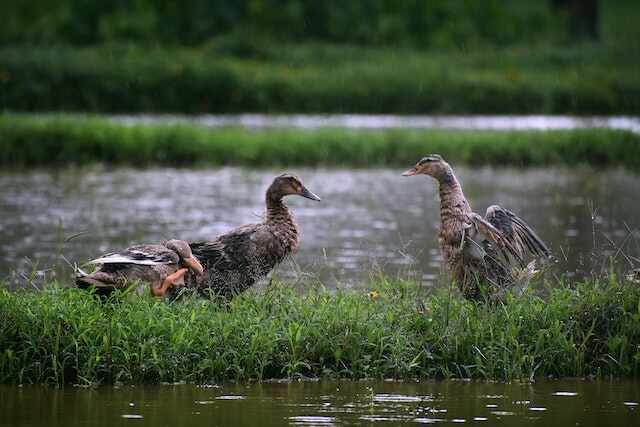
What Do Ducks Eat in the Wild?
Diving into the wild world of ducks’ diets, you may be surprised to learn that their meals consist of more than just bread crumbs. In fact, bread can be a harmful food for ducks, causing digestive issues and malnutrition.
So, what do ducks eat in the wild? Feeding ducks in the wild means providing them with a nutritious diet that meets their nutritional requirements. Ducks have an omnivorous diet, which implies they consume both plants and animals.
Their diet typically consists of aquatic plants, seeds, insects, snails, and small fish. They also enjoy foraging for food on land, such as grass and grains.
In summary, feeding ducks in the wild requires more than just throwing them bread crumbs. Providing them with a balanced and nutritious diet that meets their nutritional requirements is crucial for their health.
| Natural Diet |
|---|
| Aquatic plants |
| Insects |
| Snails |
| Small fish |
| Crustaceans |
In the next section, we’ll explore alternative foods for feeding ducks that are both safe and beneficial.
Alternative Foods for Feeding Ducks
If you want to treat your feathered friends to a healthy snack, there are plenty of options that will send them into a feeding frenzy like a kid in a candy store. Bread is a popular treat to feed ducks, but it’s not their ideal food.
In fact, bread can be a harmful food for ducks as it lacks the essential nutrients they need to stay healthy. Fortunately, there are alternative foods for ducks that are much safer and healthier.
Some of the best foods for ducks include corn, peas, lettuce, and oats. These foods are rich in essential nutrients like protein, fiber, and vitamins that ducks need to maintain their health.
You can also try feeding them duck pellets or cracked corn, which are available at most pet stores. When feeding ducks, it’s important to remember to only feed them safe foods.
Avoid feeding them foods that are high in salt or sugar, like chips or candy. Also, make sure to avoid feeding them any moldy or spoiled foods.
These can be harmful to their health and could even make them sick. Feeding ducks healthy foods is not only good for their health, but it’s also an excellent way to build a bond with them.
If you want to learn more about healthy foods for ducks, keep reading about vegetables: a healthy option for ducks.
| Alternative Foods |
|---|
| Vegetables |
| Fruits |
| Seeds and grains |
| Pellets |
| Insects |
Vegetables: A Healthy Option for Ducks
Now, let’s talk about what veggies you can offer to your feathered friends to keep them healthy and happy. While bread may seem like a convenient option to feed the ducks, it’s important to remember that it’s not an appropriate food for ducks.
In fact, consuming too much bread can lead to malnutrition and other health issues in ducks. Instead, offering vegetables to ducks can provide them with the necessary nutrients they need to stay healthy.
Some of the appropriate vegetables that you can give to ducks include peas, corn, carrots, broccoli, and spinach. These veggies are rich in vitamins and minerals that are essential for their growth and development.
However, it’s important to chop these vegetables into small, bite-sized pieces to make it easier for ducks to eat them.
You can also offer them as a mix in their regular feed or as a separate treat. In addition to providing nutrition, feeding vegetables to ducks can also be a fun activity for the whole family.
You can involve your kids in the process by letting them help chop the veggies into small pieces, or by taking them to feed the ducks in the park.
By incorporating vegetables into their diet, you’re not only ensuring their nutritional needs are met, but you’re also promoting a healthy and enjoyable lifestyle for these feathered friends.
Now, let’s move onto the next section to learn more about fruits: a sweet treat for ducks.
| Vegetables | Nutrients |
|---|---|
| Carrots | Vitamin A, fiber |
| Peas | Protein, fiber |
| Kale | Vitamin K, calcium |
| Sweet potato | Vitamin A, potassium |
| Squash | Vitamin C, fiber |
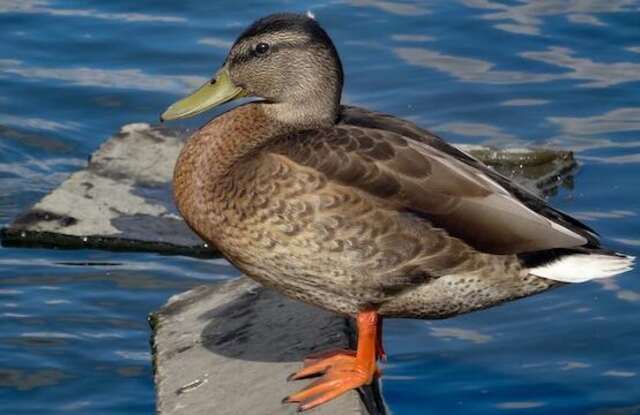
Fruits: A Sweet Treat for Ducks
If you’re looking to treat your feathered friends to something sweet, then fruits are the way to go. Not only are they a tasty snack for ducks, but they also provide essential vitamins and nutrients that are crucial to their health.
Here are a few fruits that ducks love:
- Blueberries: These antioxidant-rich berries are a great way to boost your duck’s immune system.
- Watermelon: The juicy flesh of a watermelon provides hydration for your ducks, especially during the hot summer months.
- Grapes: These bite-sized treats are easy for ducks to eat and provide a good source of energy.
While it may be tempting to feed ducks bread, it’s important to remember that bread can be harmful to their health.
Bread lacks the necessary nutrients that ducks need to thrive, and it can also cause digestive problems. Instead, consider alternative foods for feeding ducks such as fruits, vegetables, and seeds.
In the wild, ducks naturally consume a diet that consists of aquatic plants, insects, and small fish.
While it may be difficult to mimic this diet in a domestic setting, it’s important to provide your ducks with foods that closely resemble their natural diet.
This helps to ensure that they receive the necessary nutrients that they need to live a healthy and happy life.
As we move onto the next topic about seeds and grains, keep in mind that fruits are a great way to provide your ducks with essential vitamins and nutrients.
By incorporating a variety of fruits into their diet, you’ll be able to keep your ducks happy and healthy.
| Fruits | Nutrients |
|---|---|
| Apples | Fiber, vitamin C |
| Berries | Antioxidants, fiber |
| Grapes | Vitamin C, potassium |
| Watermelon | Vitamin A, potassium |
| Cantaloupe | Vitamin C, beta-carotene |
Seeds and Grains: A Nutritious Choice for Ducks
Seeds and grains are packed with essential vitamins and nutrients, making them a nutritious option to add to your feathered friends’ diet.
As you may already know, ducks are omnivores and have a varied diet that includes both plant and animal matter.
While you may be tempted to feed them bread, it’s important to know that this is not the most appropriate food for ducks.
Instead, you can offer them a mix of seeds and grains that will provide them with the nutrition they need.
Feeding ducks seeds and grains is a great way to supplement their diet and ensure that they are getting all the nutrients they need.
Some of the most popular seeds and grains that you can offer to your ducks include cracked corn, wheat, barley, and oats.
These foods are rich in protein, fiber, and carbohydrates, which are all essential for the health and wellbeing of your feathered friends.
In addition to providing your ducks with a nutritious diet, it’s also important to consider their feeding habits.
Ducks are social animals that tend to feed in groups, so it’s best to scatter the seeds and grains on the ground in an open area where they can all gather and feed together.
This will help to prevent any fighting or aggression over food, and ensure that all your feathered friends are well-fed and happy.
By making these simple changes to your ducks’ diet and feeding habits, you can help to promote their overall health and wellbeing.
| Seeds and Grains | Nutrients |
|---|---|
| Corn | Carbohydrates, protein |
| Wheat | Protein, fiber |
| Oats | Protein, fiber |
| Barley | Protein, fiber |
| Sunflower seeds | Fat, protein |
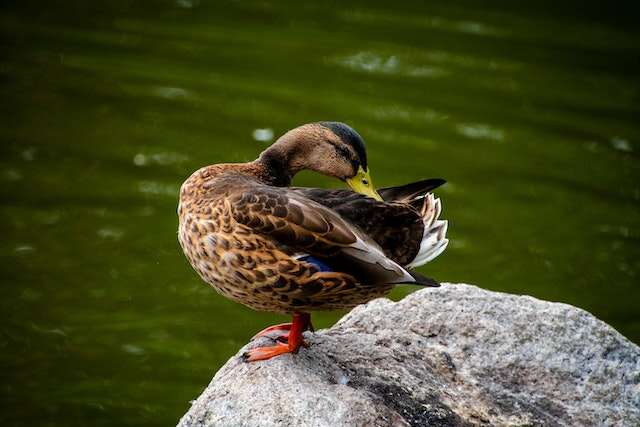
Feeding Ducks Responsibly: Tips and Guidelines
Feeding your feathered friends responsibly is easy with these helpful tips and guidelines!
First and foremost, it’s important to know that bread is harmful to ducks. Although it may seem like a fun treat to feed them, bread can cause malnutrition, obesity, and even death in ducks.
Instead, opt for alternative foods such as seeds, grains, vegetables, and fruits. These foods provide essential nutrients that ducks need to thrive.
If you live in an urban area, it can be tempting to feed ducks at local parks or ponds. However, it’s important to follow guidelines to ensure that feeding does not harm the ducks or their environment.
First, only feed ducks in designated areas and avoid overfeeding them.
Second, don’t feed them human food, including bread, chips, and crackers.
Third, dispose of any litter or trash properly to avoid polluting the water or harming wildlife.
By feeding ducks responsibly, you can help maintain a healthy ecosystem for these beloved animals. Remember to always prioritize their health and well-being over our desire to interact with them.
So next time you visit a pond or park with ducks, bring some seeds or grains instead of bread and follow the guidelines to ensure a safe and enjoyable feeding experience for both you and the ducks.
| Tips and Guidelines |
|---|
| Offer a varied diet |
| Limit the amount of food |
| Feed ducks in appropriate areas |
| Avoid feeding ducks bread |
| Do not feed ducks from your hand |
Frequently Asked Questions
How long do ducks typically live in the wild?
Imagine yourself at a serene lake, surrounded by lush greenery and the sweet melodies of nature.
In this tranquil setting, you spot a group of graceful ducks swimming in the water. Have you ever wondered how long these lovely creatures typically live in the wild?
Well, the answer varies depending on the species of duck. For instance, the average lifespan of a Mallard duck is around 5–10 years, while a Wood Duck can live up to 15 years.
Factors that can affect their lifespan include predation, disease, and habitat destruction.
Regardless, watching these elegant birds glide effortlessly on the water is a true delight, and it’s a privilege to witness them thrive in their natural habitat.
Are there any specific breeds of ducks that don’t eat bread?
If you’re wondering about specific breeds of ducks that don’t eat bread, it’s important to note that ducks, in general, have a diverse diet that includes aquatic plants, insects, small fish, and other organisms found in and around their habitats.
While there may be some individual ducks that have certain dietary restrictions, there are no specific breeds of ducks that are known to avoid bread.
However, it’s important to remember that feeding ducks bread can actually be harmful to their health and disrupt their natural diet.
Instead, consider offering them more nutritious options like grains, seeds, and chopped vegetables.
Can feeding ducks bread in moderation be harmful?
Feeding ducks bread in moderation can actually be harmful to their health. It’s a popular pastime to feed ducks in the park, but bread lacks the nutrients that ducks need for a balanced diet.
In addition, bread can cause digestive issues for ducks and lead to a condition called ‘angel wing,’ where their wings grow abnormally and prevent them from flying properly.
Instead of bread, consider feeding ducks healthy alternatives like seeds, grains, vegetables, or even specially formulated duck food.
Your local park or wildlife organization may have guidelines on what’s best to feed ducks in your area.
What is the best time of day to feed ducks?
Feeding ducks can be a fun and rewarding experience, but it’s important to know when the best time is to do so. The ideal time to feed ducks is in the early morning or late afternoon, when the sun is not too high in the sky and the temperature is cooler.
This is because ducks tend to be more active during these times and are more likely to come out of the water to eat.
Additionally, feeding ducks during these times can help prevent overcrowding and potential aggressive behavior among the ducks.
Remember to always feed ducks in moderation and with appropriate food, avoiding bread as it can be harmful to their health.
How can you tell if a duck is malnourished?
To determine if a duck is malnourished, there are a few signs to look out for. Firstly, a malnourished duck may appear skinny or underweight.
You may also notice a decrease in their activity levels and overall energy. Another indicator is a dull or discolored beak and feathers.
If you suspect a duck is malnourished, it’s important to seek the advice of a wildlife rehabilitator or veterinarian who can provide proper care and nutrition.
Remember, feeding ducks bread may actually contribute to malnourishment and other health issues, so it’s important to provide them with a balanced diet of appropriate foods.
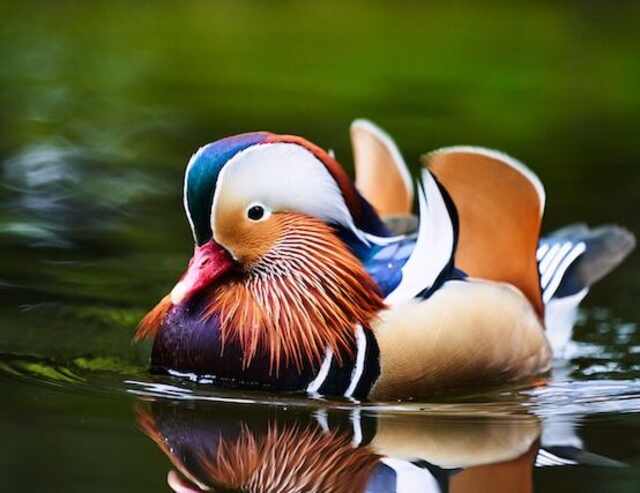
Conclusion
So, now you know that feeding ducks bread is not a good idea. Instead, you can offer them a variety of healthy and nutritious foods that will keep them happy and healthy.
According to a survey conducted by the Royal Society for the Protection of Birds, 1 in 3 people in the UK still feed ducks bread despite knowing that it can harm them.
This shows that there is still a lack of awareness about the harmful effects of bread on ducks.
By choosing to feed ducks a balanced and nutritious diet, you’re not only helping them lead a healthy life, but also contributing to the conservation of their habitat.
So, the next time you visit a park or a pond, remember to leave the bread at home and offer them a variety of healthy foods instead. By doing so, you can be a responsible and compassionate duck feeder.

